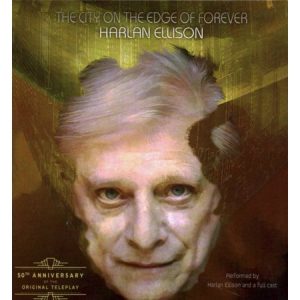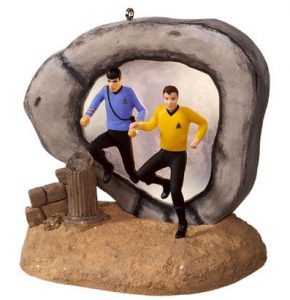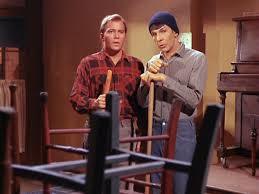
In a dark coincidence just a week before his death, I decided to pick up Harlan Ellison’s “The City on the Edge of Forever.” Shamefully, Harlan Ellison wasn’t really on my radar outside of his work on the critically acclaimed Star Trek episode.
But I’d just finished reading The Fifty-Year Mission: The Complete, Uncensored, Unauthorized Oral History of Star Trek: The First 25 Years by Edward Gross and Mark A. Altman. Ellison’s role in that account wasn’t necessarily a big one, but it is absolutely one that stood out. Because usually, people tend to try and be nice.
He didn’t seem to bother with that nonsense, and instead doubled down on it with a volatile temper. In “The City on the Edge of Forever,” his friend and fellow Star Trek writer D.C. Fontana compares his fury to the hydrogen bomb and notes that “There are still places on the Paramount lot where nothing will grow.”
It was Ellison’s absolute certainty that the most revered episodes of Star Trek was a piece of garbage compared to his teleplay was the most interesting. It’s intriguing enough to pick up the original teleplay and have a look for myself. Most people would be happy to have their name on one of the greatest episodes of one of the greatest franchises in history. But this is Ellison. So instead, it’s “a wretched, half-witted, abortive version of my lovely script.” The final product wasn’t what Ellison envisioned, so it might not as well of been made at all.
What This Book Is
This book is incredibly interesting from a historical perspective. I think the most meaningful comparison would be to the release of Harper Lee’s “Go Set a Watchman” in 2015. You can easily recognize “To Kill a Mockingbird” within its pages, but they are clearly entirely different creatures. So it is with Ellison’s original teleplay for “The City on the Edge of Forever.”
This book contains a couple different script treatments, and then the original teleplay he submitted to the Hugo Awards. If you’re lucky enough to pick up the audio version, it features an outstanding cast of narrators that includes Levar Burton.
Ellison’s original teleplay is an absolutely amazing story. The only problem with it? It is not recognizable at all as Star Trek.
The City on the Edge of Forever Teleplay
Teleplay Summary
It starts out with a drug-addicted Enterprise officer pleading with Beckwith, another Enterprise officer, for some more drugs. Beckwith agrees, but only if LeBeque will give him the scoop on what the next planet they’re visiting is like. That way, Beckwith can continue his pattern of exploiting and plundering primitive cultures to gain personal wealth. This has apparently been going on for a while, and it definitely colors the preceding episodes to think that Beckwith was behind the scenes stealing from and undermining the aliens they encounter.
In Ellison’s version, after getting his fix, LeBeque has a crisis of conscience and decides to reveal the truth to Captain Kirk. But before he does, Beckwith murders him to keep his secret. They apprehend him, and Captain Kirk assembles a team to beam down to the planet with him. Why go down to the planet? BECAUSE THEY ARE GOING TO EXECUTE BECKWITH. The death penalty is alive and well in Ellison’s Starfleet.
Much of the episode unfolds the same way, but instead of McCoy wandering through the portal, it is Beckwith fleeing Kirk’s execution squad. At one point after Beckwith travels through the Guardian, some of the crew beam back up to the Enterprise. Turns out that Beckwith altered the timeline, and the Enterprise is erased from history in the process. Instead of the Enterprise, a vessel of space pirates is orbiting the planet.
The biggest difference in the remainder of the story is its conclusion. The gang travels back in time and successfully stops Beckwith from saving Edith Koestler (Kessler in the episode), and they return to the 23rd Century. But because they still have a criminal on their hands, the Guardian offers to take care of him. Worried “take care of him” means something nice? Ellison quickly dispels that concern. The Guardian transports Beckwith into the heart of a star. But death brings no mercy. In its cruelty, the Guardian instead revives Beckwith so he can repeat the disintegration process for eternity.
Teleplay Thoughts
Reading the original teleplay, it becomes pretty clear why it needed a rewrite.
- Drug dealers and addicts on the Enterprise.
- While Kirk is meeting new life and new civilizations, one of his crew has also been destabilizing their societies.
- Execution still being alive and well in the 23rd Century.
- Kirk willingly accepting the eternal torment of one of his crew members.
There’s a lot of very un-Star Trek things going on in here. This would be outstanding in its original form as an episode of The Twilight Zone or Outer Limits. But there is very little in it that captures the spirit of Star Trek. After decades of attacking Roddenberry for desecrating his work, an afterward to The City on the Edge of Forever has D.C. Fontana admitting that both herself and Gene L. Coon did the first two rewrites but decided to not spill the beans to Ellison to help keep the peace (See her earlier comparison to his temper to a hydrogen bomb).
The Introduction
The teleplay was an interesting read. If you’re a Star Trek fan, that is definitely worth the price of admission alone. It. Is. A. Shitshow. And it is glorious.
I like reality television. The Real Housewives of Potomac is appointment viewing for me. I even love the later seasons of MTV’s Real World. The ones where everybody is just constantly drunk and yelling? Yeah, I’m watching those. Watching drama unfold is a hobby I’m passionate about.
Ellison is infinitely more dramatic than any participant in any Real Housewives series. The introduction to this book is just fifty pages of Ellison celebrating Festivus like I’ve never seen before. I cannot imagine the man has a grievance that went unaired by the time he was finished. The decades since all of the drama surrounding The City on the Edge of Forever have done very little to calm the fury in Ellison’s heart.
He opens his introduction challenging the notion that you shouldn’t speak ill of the dead. This is for obvious reasons as Gene Roddenberry had just died a couple years earlier. If Ellison’s Roddenberry-related fury is off-the-table, then there is a lot less writing to be done. And I have zero reason to disbelieve any of his claims about Roddenberry. The dude seemed exceptionally self-serving and always eager to contribute to his ever-expanding myth.
But Ellison’s fragility shines through this introduction. His need for people to not only see his perspective, but to embrace it as the only perspective is palpable. He lambasts other writers for not doing their jobs properly. Ellison attacks Star Trek fans as “brain-damaged.” His own errors are innocent accidents, but everyone else’s are malicious. When Roddenberry said Ellison’s script had Scotty selling drugs, he did so because he’s a monster. But when Ellison spent decades blasting Roddenberry for rewrites to his script that actually came from Fontana? That’s just a run of the mill mix-up.

Conclusion
I don’t think I like Ellison the person very much. But The City on the Edge of Forever is an excellent look into the history of Star Trek, and an insightful peek at the writer’s initial vision of the almost universally beloved episode. Plus, so much gossip.
The City on the Edge of Forever by Harlan Ellison gets a solid four out of five mics, and can be purchased on Amazon through our affiliate link here.



add a retrospect review /comparison of the episode and other commentary from other people involved, like the cast of the audiobook and other ST writers or other writers?